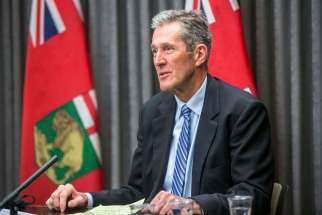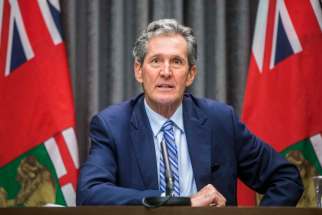Manitoba considers easing more pandemic restrictions as COVID cases decline
Read this article for free:
or
Already have an account? Log in here »
To continue reading, please subscribe:
Monthly Digital Subscription
$0 for the first 4 weeks*
- Enjoy unlimited reading on winnipegfreepress.com
- Read the E-Edition, our digital replica newspaper
- Access News Break, our award-winning app
- Play interactive puzzles
*No charge for 4 weeks then price increases to the regular rate of $19.00 plus GST every four weeks. Offer available to new and qualified returning subscribers only. Cancel any time.
Monthly Digital Subscription
$4.75/week*
- Enjoy unlimited reading on winnipegfreepress.com
- Read the E-Edition, our digital replica newspaper
- Access News Break, our award-winning app
- Play interactive puzzles
*Billed as $19 plus GST every four weeks. Cancel any time.
To continue reading, please subscribe:
Add Free Press access to your Brandon Sun subscription for only an additional
$1 for the first 4 weeks*
*Your next subscription payment will increase by $1.00 and you will be charged $16.99 plus GST for four weeks. After four weeks, your payment will increase to $23.99 plus GST every four weeks.
Read unlimited articles for free today:
or
Already have an account? Log in here »
Hey there, time traveller!
This article was published 04/02/2021 (1770 days ago), so information in it may no longer be current.
Manitobans could see nearly three months of pandemic restrictions loosened even further next week, as COVID-19 case counts continue a steady decline across the province.
Premier Brian Pallister told a news conference Thursday the province is considering allowing more facilities and businesses to reopen because cases have remained stable since some lockdown restrictions were eased Jan. 23.
Proposed changes
The province is seeking input from Manitobans online, through EngageMb.ca, about the easing of restrictions, which would take effect at 12:01 a.m. Feb. 13, if approved.
The following changes are being proposed for all of Manitoba:
● Allowing food services, including restaurants and lounges, to reopen at 25 per cent capacity with closure time of 10 p.m., limited to patron groups of household members.
The province is seeking input from Manitobans online, through EngageMb.ca, about the easing of restrictions, which would take effect at 12:01 a.m. Feb. 13, if approved.
The following changes are being proposed for all of Manitoba:
● Allowing food services, including restaurants and lounges, to reopen at 25 per cent capacity with closure time of 10 p.m., limited to patron groups of household members.
● Allowing personal services, including nail salons and tattoo parlours, to reopen at 25 per cent capacity with adequate physical distancing, enhanced personal protective equipment measures and requirements to collect information for contact-tracing purposes.
● Allowing gyms to reopen at 25 per cent capacity for one-on-one and individual training sessions with adequate physical distancing, with no group classes.
● Allowing places of worship to reopen at a maximum of 10 per cent capacity, or 50 people, whichever is lower.
● Allowing libraries to reopen at a maximum of 25 per cent capacity, limited to patron groups of household members.
● Allowing organized outdoor sports to resume for games or practices, but no multi-team tournaments).
● Clarifying that addictions support and treatment groups can operate with adequate physical distancing measures in place.
● Allowing the film industry to resume work, with safety protocols in place.
● Opening public washroom facilities with 25 per cent capacity and enhanced signage.
● Increasing capacity for weddings to up to 10 people in addition to the officiant and photographer.
● Allowing photographers to resume operations outdoors and with studio capacity limited to patron groups of household members only.
“Two weeks ago, for the first time in over two months, we were able to make some modest changes to our public health orders and begin the process of safely and gradually reopening the economy and our communities,” Pallister said.
“Today is another big day.”
Manitoba’s COVID-19 numbers and test positivity rates are the lowest since October, with 110 new cases of the virus announced Thursday. The five-day test positivity rate was 6.7 per cent in Manitoba, and 3.6 per cent in Winnipeg.
While Manitoba will remain at the critical, code-red level under the pandemic response system, a long list of changes is being proposed for the entire province, including allowing restaurants, gyms and churches to reopen at limited capacity.
The changes, if approved, would take effect Feb. 13.
But one Winnipeg intensive-care physician worries relaxing more restrictions now is a mistake.

“I’d suggest waiting,” Dr. Anand Kumar said by phone Thursday.
“I’d be very cautious.”
Kumar said it’s too soon to determine whether the relaxed restrictions that took effect Jan. 23 — which allowed hair salons to open, households to have two designated visitors and stores to sell non-essential items in all but the northern region of Manitoba — will drive up case numbers and hospitalizations. He warned it could take more than two weeks for the virus to spread and for people to develop severe symptoms requiring hospitalization.
But chief provincial public health officer Dr. Brent Roussin said Thursday he doesn’t believe it’s too soon to further loosen restrictions — as long as Manitobans follow public health orders and recommendations to stop the spread of COVID-19.
He said Manitoba has seen a drop in COVID-related hospitalizations.
“Right now, we’re in a much more stable place than we were in November and December,” Roussin said.
COVID at a glance
Two additional COVID-19 deaths were reported in Manitoba Thursday.
The virus claimed the lives of a man in his 70s from the Winnipeg health region and a woman in her 90s from the Winnipeg health region, linked to the outbreak at Southeast Personal Care Home.
Of the 110 new cases reported Thursday, 39 are in the Northern health region, 33 are in Interlake–Eastern health region, seven cases in the Prairie Mountain Health region, five cases in the Southern Health and 26 cases in the Winnipeg health region.
There have been 29,968 lab-confirmed cases in Manitoba.
There are 3,340 active cases, 25,791 Manitobans have recovered and 837 have died.
Of the 264 hospitalizations, 109 patients are active COVID-19 cases, 155 have COVID-19 but are no longer infectious.
There are 20 people in intensive care units with active COVID-19 as well as 16 people with the virus who are no longer infectious but continue to require critical care for a total.
Laboratory testing numbers show 2,183 tests were completed yesterday, bringing the total number of lab tests completed since early February 2020 to 484,302. Case investigations continue and if a public health risk is identified, the public will be notified.
He noted the proposed changes to restrictions do not include the reopening of bars, which was linked to the transmission of the virus in the fall. “We’re opening restaurants and lounges but with even stricter capacity issues because we’re only allowing household members to sit together,” he said.
The province is prepared to enforce the new orders if they aren’t followed, but Pallister said he believes Manitobans are in a different place now than in the fall — having suffered many hardships, including the loss of hundreds of lives, since then.
“The place we’re in now, we’re all in this together — in a more genuine way and I hope in a more productive way,” the premier said. “The future is in our hands.”
Meanwhile, critics accused Pallister of using Thursday’s announcement on restrictions to divert attention from a damning review of the Maples care home that was released the same day.
“I do think that the premier’s coming out with the announcement today is an attempt to distract from the release of the review into the Maples personal care home disaster and the tragedy that that was,” NDP Leader Wab Kinew told reporters Thursday.
Liberal Leader Dougald Lamont agreed: “I do think it’s a diverson on the part of the premier to be talking about this as an attempt to shove the Maples personal care home report off the front page.”
Lamont said the Pallister government didn’t prepare for the second wave of the pandemic, and he’s concerned that a third wave of the virus will hit, leaving the province unprepared again. “We’ve seen this movie before,” he said.
carol.sanders@freepress.mb.ca

Our newsroom depends on a growing audience of readers to power our journalism. If you are not a paid reader, please consider becoming a subscriber.
Our newsroom depends on its audience of readers to power our journalism. Thank you for your support.







